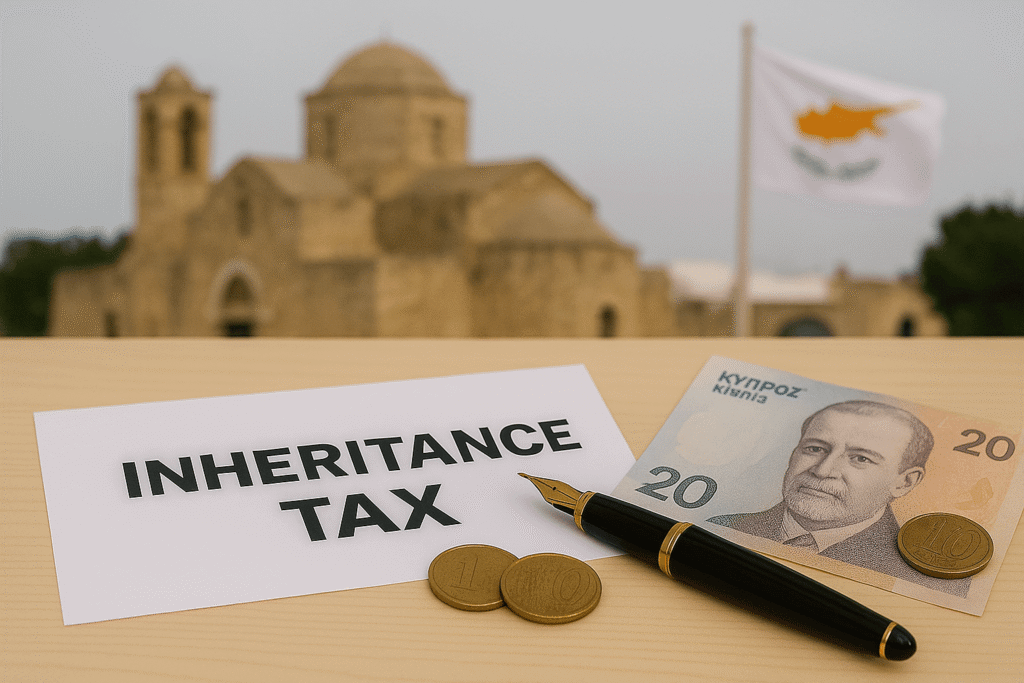The absence of inheritance and gift taxes in Cyprus offers significant advantages in transferring wealth between generations, but planning is still important. Thoughtful planning of asset transfers – whether through a will or during one’s lifetime – can save tens or even hundreds of thousands of dollars, especially when dealing with assets that have high capital gain potential or tax implications in other countries.
Inheritance Taxation in Cyprus
Cyprus abolished the inheritance tax on January 1st, 2000. The main catalyst for the government’s decision was to make the country more attractive to foreign investors and competitive compared to other countries.
Currently, Cyprus (Limassol, Nicosia, etc.) does not impose any tax on the transfer of assets through inheritance or gifts – not on the deceased, the giver, or the recipient. This fact makes it an attractive destination for the intergenerational planning of assets and family investments.
However, if the inheritance involves real estate property, the heir may be required to pay transfer fees. The rate of transfer fees depends on the relationship between the heir and the deceased, as well as the value of the property. This means that children or parents of the deceased will pay lower transfer fees than spouses and other family members.
Why is Advance Planning Still Important?
Despite the absence of inheritance tax in Cyprus, it’s important to understand that planning asset transfers is not just a matter of taxation – but primarily a legal, regulatory, and family matter. Early planning of inheritances allows for efficient handling of bureaucratic procedures, prevention of objections, and anticipation of possible tax charges in other countries.
Inheritance Taxation in Israel Compared to Cyprus
In Israel, like Cyprus, there is no estate tax or inheritance tax. However, in certain cases, tax may be imposed on the full value of the inheritance received, such as capital gains tax when selling the asset.
Comparison to Other Countries
- Many countries around the world implement inheritance tax policies at various rates: Greece – Inheritance tax of up to 40%, determined by the relationship between the heir and the deceased and the value of the transferred assets.
- Spain – Inheritance tax of up to 34%, varying according to the relationship between the heir and the deceased and the geographic region in Spain.
- France – Inheritance tax of up to 60% based on family relationship and inheritance value.
Germany – Inheritance tax ranging from 7% to 50%, varying according to family proximity and the value of transferred assets. - Switzerland – Inheritance tax of up to 50%, with the exact rate varying between different cantons.
- Italy – Inheritance tax of 6% to 8%, determined mainly by the value of transferred assets.
In contrast, countries such as Portugal, Latvia, Sweden, and Austria have chosen to completely abolish inheritance tax, similar to Cyprus.
Making a Will in Cyprus – The Key to Tax Savings and Dispute Prevention
Despite the absence of inheritance tax, making a will in Cyprus is important due to local inheritance laws. Heirs don’t always receive their inheritance smoothly. Sometimes complex procedural steps are needed to obtain a probate order or permission to realize the assets. A will allows determining the distribution of assets according to the deceased’s wishes and prevents future disputes.
A well-organized and detailed will can ensure that assets are transferred smoothly and efficiently to the heirs. The will should include the wishes of the deceased but must also be adapted to the requirements of the law so that its validity is not compromised.
At the stage of drafting a will, it is often possible to choose the law that will apply to it. This choice can have a significant impact on inheritance planning and its future implementation.
Without advance planning, meaning inheritance without a will, the law that will apply to the deceased’s assets will be the law of the deceased’s last and principal place of residence.
In Cyprus, there is a system of ‘forced heirship.’ This means there are several rules regarding how the deceased’s estate is distributed, with part of the estate automatically passing to legal heirs (close family members). Thus, in Cyprus, the deceased’s right to choose who to leave their assets to applies only to a portion of their assets, and for this purpose, they must make a valid will that clearly and legally explains how the assets should be distributed.
Forced Heirship
If you own assets in Cyprus, our recommendation is to make a will to ensure that the transfer of assets is done as smoothly as possible. A will can prevent misunderstandings or lengthy legal processes and ensure that the process proceeds in an orderly manner even after the death of the deceased.
Practical Information on Realizing Inheritance in Cyprus
To realize an inheritance in Cyprus, documents such as the deceased’s death certificate, will (if exists), copies of heirs’ identification documents, asset ownership documents, bank account confirmations, and more are usually required.
The process of realizing inheritance from Cyprus may take between several months to a year or more, depending on the complexity of the deceased’s estate, the number of heirs, the existence of a will, etc.
Received an Inheritance in Cyprus? 6 Steps for Proper Realization of Inheritance from Cyprus
1. Clarification of Factual and Legal Background
First, check the type of asset that is to be inherited, its location, the identity and status of the heirs, the value of the asset, and more.
2. Checking the Timing and Location of Inheritance Realization
Consider whether it’s advisable to realize the asset now, and if so, where is it better to realize it – in Cyprus or in Israel?
3. Regulatory and Banking Aspects
It is recommended to check the costs of money transfers, whether there is a need to open an account in Cyprus or another country for the purpose of transferring funds, what approvals are required, etc.
4. Planning the Asset Transfer
Consider whether to transfer the asset itself or its proceeds, and what the implications are in terms of tax, exemptions, deductions, etc.
5. Checking the Future Effects on the Asset
It is recommended to examine the future effects on the asset, for example, a future sale of the asset will often be subject to capital gains tax in Israel as well.
6. Transferring the Asset to Israel
Performing all necessary actions, submitting documents, handling matters with banks in Cyprus and Israel, and executing the asset transfer.
How Can We Help?
The goal is to transfer the inheritance to heirs in Israel in the most tax-efficient way, while addressing legal issues in Israel and Cyprus and issues related to banking and regulation. For example, whether it’s better to realize a certain asset in Cyprus or transfer it to Israel; how to transfer inheritance funds to a bank account in Israel; how to use various exemptions between heirs; whether to give gifts during lifetime; whether to establish a trust, and more. Strategic planning, according to law and tax treaties, is essential to minimize tax liabilities.
Nimrod Yaron & Co. has extensive experience in personally and professionally accompanying Israelis with assets or inheritances in many countries around the world, including Cyprus – from the first stage of planning, through dealing with authorities in Cyprus and Israel, to transferring inheritance funds to the heir’s bank account.
We work in cooperation with all relevant professional entities in Cyprus and Israel and provide legal solutions both in terms of taxation and banking, tailored to the circumstances of the case.
If you have inherited an asset or wish to bequeath assets in Cyprus in the future, our team of lawyers specializing in international taxation and inheritance law will be happy to advise you on this matter – contact us for an initial consultation.
Q&A
Do I need to pay tax in Israel on an asset inherited from Cyprus/City in Country?
No. There is no inheritance tax in Israel. However, capital gains tax may apply after selling the asset. It’s important to check what is the recommended timing for selling the inherited asset.
Why is it important to plan the transfer of assets between generations in advance?
The transfer of assets between generations from abroad is not just a family matter but also a tax and economic issue. Early planning, considering legal issues in Israel and abroad, can save a lot of money and prevent legal complications.
What are the implications in case there is no will?
In the absence of a will, the inheritance will be divided among the legal heirs according to the inheritance law of Cyprus.
What documents are required for the process of realizing an inheritance in Cyprus/City in Country?
To realize an inheritance in Cyprus, documents such as a death certificate, a will (if it exists), copies of the heirs’ ID documents, asset ownership documents, bank account confirmations, and more are required.
How long does the process of realizing an inheritance in Cyprus take?
It should be considered that the process of realizing an inheritance in Cyprus can take between several months to a year or more, depending on the complexity of the deceased’s estate, the number of heirs, the existence of a will, and other factors.









